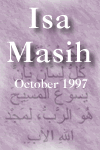Cairo circumcision controversy
A Cairo court has ruled that a government ban on female circumcision is against Islam. The ban was introduced after several deaths of girls following botched circumcisions by back-street practitioners. (Guardian)
Beheadings in Saudi
Two Filipino Christians, Ruel Janda and Arnel Betran, were beheaded in Saudi Arabia in May. The two men, who had been imprisoned for over two years, had been convicted of armed robbery, although a former cellmate alleges the charges were fabricated. Janda's Christian witness among fellow Filipino prisoners had upset the authorities. (Compass)
Violence in Pakistan
A 22 year old Muslim woman was murdered in July by a male relative because she attended Bible studies in Lahore, Pakistan (CEN). The Pakistani government and provincial authorities are meanwhile rebuilding the Christian-majority village of Shanti Nagar which was destroyed by a crowd of 30,000 Muslims in February (See Isa Masih May 1997 p10) (GO Magazine). A number of moderate Muslim organisations in Britain have condemned the violence. The Secretary General of the World Islamic Mission stated that 'as Muslims we view acts of violence against non-Muslims living in a Muslim majority country as a violation of the teachings of our prophet'. (MAB Bulletin Summer 1997)
Joint statement on religious coercion
A joint Islamic/Catholic communique has stipulated that those 'continuing to live, witness and share their faith' must 'respect human dignity' entailing 'respect for the religion of the other when speaking and writing' and observing 'freedom of conscience'. It concluded that 'Christianity and Islam agree that no compulsion should be used on persons or societies in the name of religion'. The statement resulted from a colloquium held jointly in Vatican City, Rome on April 27-30 by the World Islamic Call Society of Tripoli, Libya and the Pontifical Council for inter-religious dialogue. (LtM Newsletter)
Change in Race Relations Act?
Religious discrimination in Britain may be made illegal this autumn, when the European Convention on Human Rights is due to be incorporated into British law. The new law would extend the protection offered by the 1976 Race Relations Act to religious minorities in England and Wales, including the Muslim community which has been pressing for the change for many years. The Home Office has in the past opposed the move, arguing that it is difficult to find a legal definition to distinguish genuine religions from cults. (SFI Newsletter September 1997)
Nation of Muslim-haters?
A new report by the Runnymede Trust titled 'Islamophobia: Its Features and Dangers' (available free of charge from 133 Aldersgate St, London EC1A 4JA; tel 0171 600 9666) highlights the growing fear and hatred of Muslims in Britain. The Trust wishes to bring a change to the Race Relations Act to outlaw discrimination on grounds of religion (MAB Bulletin). A paper giving a thorough critique of the report is available on request from the Centre for Islamic Studies, London Bible College (Tel 01923 826061, Email [email protected])
Growing internet interest
Over 30 million people have access to the Internet, including many in countries closed to the Gospel. Taking advantage of this opportunity, several missions have cooperated to provide websites suitable for Muslims. Muslims from many countries closed to traditional avenues of mission work visit regularly and many become involved in detailed discussions.
Apologising for the Crusades
A large contingent of Christians, in a serious attempt to redress the church's historical faults are undertaking the Reconciliation Walk. By retracing the steps of the Crusaders through Europe and down to Istanbul they plan to reach Jerusalem in 1999 while seeking reconciliation and forgiveness en route. More details can be obtained from PO Box 61, Harpenden, Herts AL5 4JJ. (Kitab)
Bibles confiscated
A shipment of nearly 25,000 Uzbek New Testaments was confiscated by customs officials on 28 February 1997. The decision to take the books was made on the basis of a special letter from the Council of Religious Affairs of the Cabinet of Ministers of Uzbekistan. The CRA stated that it considered Bible distribution a 'missionary activity', and refers to all the indigenous people of Uzbekistan as Muslims. (SFI Newsletter July 1997)
More missionaries to Muslims
According to Frontiers, the number of missionaries to Muslims has increased in the last few years from 1,000 to 2,000. This means there is now one Christian missionary for every 500,000 Muslims! (LtM Newsletter)
Muslim cybervillage
Project Cafe Medina is a proposed scheme to link all mosques and Islamic schools in the UK to each other and to the internet. A Muslim leader said last year that he wanted to see Muslim children become at one with the internet and all the tools that are necessary to comprehend this new massively expanding medium of communication. (Kitab June 1997)































